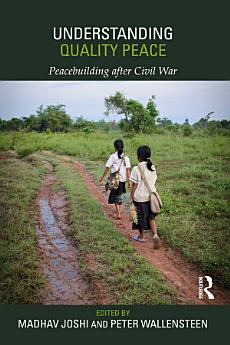Understanding Quality Peace: Peacebuilding after Civil War
À propos de cet e-book
Including contributions from more than 20 researchers and practitioners, it argues that the quality of the peace in a post-conflict state relates to the extent to which peace accords are implemented, the agreed-upon mechanism for the non-violent resolution of the conflict, and the available social space for civil and political actors. To arrive at the concept of 'quality peace', the authors evaluate the existing literature and identify a lack of a satisfactory means of measuring outcomes, and consequently how these might be researched comparatively. The volume problematizes the 'quality peace' concept as a way to understand the origins of armed conflict as well as problems deriving from the conflict dynamics and the need for social, political, and economic changes in the post-conflict periods.
The book emphasizes five dimensions as crucial for quality peace in a post-accord society. Negotiations and agreements not only aim at avoiding the return of war but also seek to: (1) promote reconciliation, (2) develop mechanisms for resolving future disputes, (3) provide for reliable security, (4) open economic opportunities for marginalized segments of the population, and (5) generate space for civil society. These five dimensions together provide for quality peace after war. They are studied in the context of internal armed conflicts in which multiple parties have signed a peace agreement.
This book will be of great interest to students of peace and conflict studies, civil wars, global governance, security studies, and International Relations in general.
À propos de l'auteur
Madhav Joshi is Research Associate Professor and Associate Director of the Peace Accords Matrix project at the Kroc Institute for International Peace Studies, University of Notre Dame, USA.
Peter Wallensteen is Professor of Peace and Conflict Research, Uppsala University, Sweden, and University of Notre Dame, USA. He is editor/author of many books, including, recently, Understanding Conflict Resolution (4th edition, 2015), Quality Peace: Peacebuilding, Victory and World Order (2015), and Regional Organisations and Peacemaking (co-editor, Routledge 2014).







